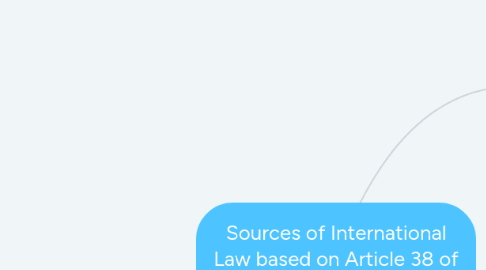
1. International conventions: agreements between states regulating behavior.
1.1. Treaties: Written international agreement concluded between the states and governed by International law.
1.1.1. State Obligations: Pacta Sunt Servanda means that agreements are binding upon the parties to it and must be performed in good faith. A State may not disregard treaty obligations based on notions of sovereignty and cannot assert internal law as a justification for failure to perform the treaty.
1.1.1.1. Restitution
1.1.1.2. Compensation
1.1.1.3. Satisfaction
1.1.2. State Responsibility under international law requires that 1. the conduct be attributable to the State and 2. It is in breach of an international obligation.
1.1.2.1. State Conduct through official organs of the state
1.1.2.2. Conduct of nonstate actors which is accepted by the State
1.1.2.3. Conduct of nonstate actor to which the State acquiesces by inaction.
1.1.2.4. The international obligations must have been violated by the conduct attributed to the State to invoke State Respnsibility
1.1.3. State Rights: A State has the right to sovereignty and a right to domestic resolution prior to international intervention.
1.2. State: The State must be one that is recognized under the principles of Statehood under the 1933 Montevideo Convention: 1. A Permanent Population 2. A defined Territory 3. Government 4. Capacity to enter into Relations with other States
1.3. Reservation: a unilateral statement made by a State when signing , ratifying, accepting, approving or acceding to a treaty, whereby it purports to exclude or modify the legal effect of certain provisions of the treaty in their application to the State. They are only applicable to multilateral treaties
1.3.1. Need not be accepted unless treaty calls for it
1.3.2. Not allowed when incompatible with the objective of the treaty or when specifically prohibited by the treaty.
1.4. Breaches are heard before the relevant international bodies.
1.4.1. International Court of Justice (ICJ)
1.4.1.1. Jurisdiction Over Contentious Cases granted by Art 36 gives jurisdiction tp all cases and matters referred by the Parties
1.4.1.2. Jurisdiction by Special Agreement: After the dispute has arisen, the parties may agree to bring the matter to the ICJ under a Compromis defining the questions for resolution.
1.4.1.3. Jurisdiction under settlement dispute clause in a treaty decided prior to the dispute
1.4.2. International Criminal Court (ICC)
1.4.3. The International Criminal Tribunal of the Former Yugoslavia (ICTY)
